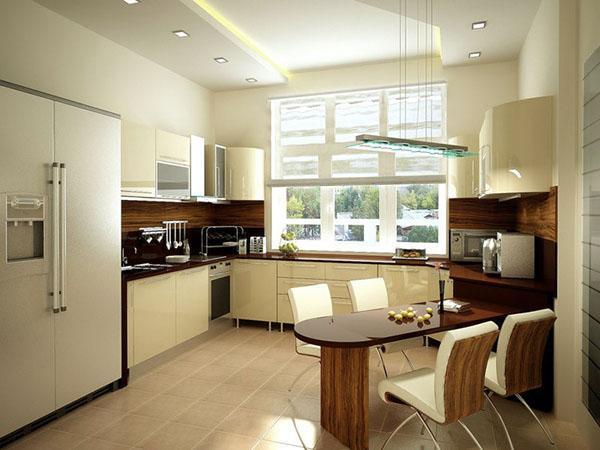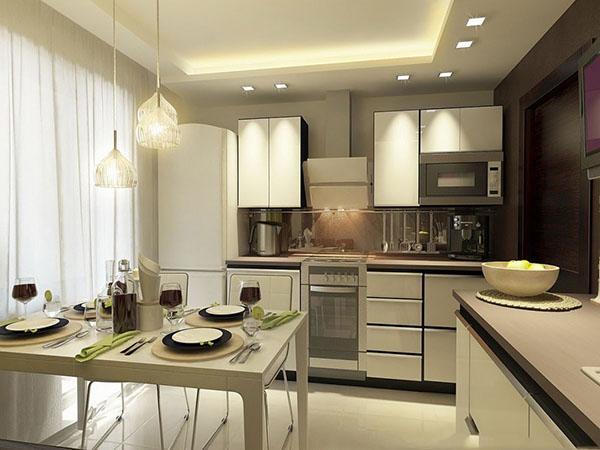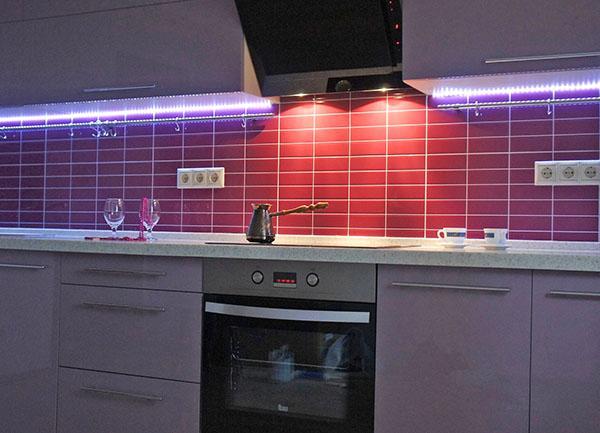What should be the lighting in the kitchen
 How to organize lighting in the kitchen is determined at the stage of designing renovation work. The paths for laying the electrical cable, the location of the lighting fixtures and sockets, are planned before finishing work. Electrical wiring - a crucial stage of repair work.
How to organize lighting in the kitchen is determined at the stage of designing renovation work. The paths for laying the electrical cable, the location of the lighting fixtures and sockets, are planned before finishing work. Electrical wiring - a crucial stage of repair work.
Lighting in the kitchen: principles of organization


There should be enough light in each of the functional areas, not counting the general:
- work zone;
- dining room.
In addition to those listed, the kitchen can be decorative lighting... It serves no other purpose than decoration. This is an optional element of the lighting system.
If the kitchen is combined with the living room, then the number of zones allocated for lighting increases.
Overhead lighting
 Kitchen lamps located on the ceiling provide basic lighting for the room. The presence of overhead streaming light creates a cozy atmosphere for a comfortable stay in the kitchen in the evening.
Kitchen lamps located on the ceiling provide basic lighting for the room. The presence of overhead streaming light creates a cozy atmosphere for a comfortable stay in the kitchen in the evening.
To organize the basic lighting in the kitchen, several spotlights located around the perimeter of the ceiling can be used. It is better to stop the choice of light on neutral or warm, not distorting shades of colors.
For a kitchen of a small area with low ceilings, it is not advisable to use massive chandeliers that visually make perception heavier.
Bus systems look the most compact. With the help of an adjustment and a swivel mechanism, you can change the location of the light zone.
Dinner Zone
The lighting above the table in the kitchen plays an important role in creating a special atmosphere during meals. The location that is defined for the table influences the choice of lighting fixture. The general rule is to fully cover the dining area with good lighting.
Pendant lights and sconces
 For a dining table that is set against one of the walls, wall sconces may be sufficient. If the table stands in such a way that people can sit around it, it is advisable to provide overhead lighting - a pendant lamp. Its style and colors of the plafond should match the overall interior of the kitchen.
For a dining table that is set against one of the walls, wall sconces may be sufficient. If the table stands in such a way that people can sit around it, it is advisable to provide overhead lighting - a pendant lamp. Its style and colors of the plafond should match the overall interior of the kitchen.
The density of the lampshades should be selected in such a way that a comfortable environment is created, and the light from the lighting device does not irritate the eyes. For a large dining table, a system of several small lamps is the best option.
Convenient when the suspension length of the luminaire can be adjusted.
Built-in lighting
 Instead of lamps with shades, built-in spotlights in the kitchen can be provided above the dining area. In this case, the lighting system is based on a plasterboard structure.
Instead of lamps with shades, built-in spotlights in the kitchen can be provided above the dining area. In this case, the lighting system is based on a plasterboard structure.
Busbar and bracket system
 The busbar system gives you great freedom in organizing lighting. With this arrangement, the directionality of the lighting can be adjusted by turns and shifts.
The busbar system gives you great freedom in organizing lighting. With this arrangement, the directionality of the lighting can be adjusted by turns and shifts.
Work zone
 The light in the kitchen above the work surface has not only aesthetic but also functional purpose.The work table is the place where food is prepared and must be very well lit.
The light in the kitchen above the work surface has not only aesthetic but also functional purpose.The work table is the place where food is prepared and must be very well lit.
When ordering a kitchen set, it is advisable to clarify the presence of such a built-in function.
Directional illumination of the worktop can be provided by lighting devices of the following types:
- luminescent;
- LED;
- halogen.
 The backlight can be built not only into furniture, but also into a glass apron located behind the working area in a plastic box. Another original option is portable lamps on special "clothespins" that can be fixed in a convenient place.
The backlight can be built not only into furniture, but also into a glass apron located behind the working area in a plastic box. Another original option is portable lamps on special "clothespins" that can be fixed in a convenient place.
The illumination of the hob from the side of the hob is usually created by lighting that is built into the hood.
Decorative lighting
 This kitchen lighting option is intended only for interior decoration. Backlighting of an unusual type can give a zest to the kitchen interior, "expand" the space.
This kitchen lighting option is intended only for interior decoration. Backlighting of an unusual type can give a zest to the kitchen interior, "expand" the space.
This can be, for example, the illumination of kitchen cabinets or an island along the plinth. LED strip is an original element of the interior that gives the kitchen a unique look and focuses on the decor elements.
Decorative lighting, with a thoughtful arrangement, will help correct the irregular shape of the room, hide architectural imperfections.
Lighting requirements

The main requirements for the organization of good lighting in the kitchen are based on the following factors:
- The distance from the lighting fixture to the water source should be from 0.6 m. This condition must be taken into account when planning a lamp in the kitchen above the sink.
- Light shades of kitchen furniture and work apron reflect much more light than dark shades.
- Light sources should not hit the eyes and cause discomfort.
- The outgoing light should not cast shadows or interfere with those sitting at the dining table.
- The lighting should be neither too bright nor too dim. For the dining area, the illumination rate is 50 W per 1 m². For a worker - 2 times more.
Organization of touch switches, especially in the work area, is a convenient solution for modern housewives. Switching on can be performed both by touching and by hitting the field of action of the installed sensor.
Small kitchen: features of the organization of lighting
 For a small kitchen space, you can adopt the same principles as for a large kitchen. Despite the small footprint, just one light source will not solve all your lighting problems.
For a small kitchen space, you can adopt the same principles as for a large kitchen. Despite the small footprint, just one light source will not solve all your lighting problems.
Uniform good light is provided by spotlights and spotlights, which are even more preferable for rooms with a modest area. Large chandeliers and massive ceiling brackets are not suitable for apartments with low ceilings. Otherwise, the kitchen will look even more miniature and uncomfortable.
The kitchen lamp above the dining area countertop can be replaced with 1-2 wall sconces. For some layouts, the overall light may be sufficient to illuminate the dining area.
The choice of lamp and shade material

Various types of lamps are used for lighting in the kitchen. To make the right choice, you need to know all their features:
- an LED lamp in the kitchen is a profitable investment - it lasts a long time, gives a bright light, has low energy consumption, but is relatively expensive;
- halogen - economical, available in various designs, which allows optimal selection of models;
- luminescent - bright and economical in terms of durability, but more expensive than conventional incandescent feet;
- Incandescent lamps are a traditional option that is losing its leading position in comparison with other options.
All kitchen lighting fixtures must comply with the mandatory safety and quality requirements. The shades are made of special non-combustible plastic, metal or glass.
Some interior styles allow for the use of fabric, wood and other materials for lampshades. In all cases, the material of manufacture must be well cleaned and not emit toxic substances.
How to avoid mistakes: 4 important tips
 Choosing even the most modern touch-sensitive lighting for the working area in the kitchen and decorating the room in the spirit of the latest fashion trends, you can make mistakes.
Choosing even the most modern touch-sensitive lighting for the working area in the kitchen and decorating the room in the spirit of the latest fashion trends, you can make mistakes.
To draw up a lighting project correctly, it is recommended to use the advice of experts:
- General lighting planning should take into account the kitchen unit.
- Just one lamp in the kitchen is not enough, even if the area of the room is up to 5 m².
- It is convenient to be able to adjust the brightness of the general lighting. This condition can be met using a dimmer.
- A dimmer is not required in the work area.
The dimmer must be of high quality, otherwise it will quickly deteriorate.
 For the competent organization of lighting, it is necessary to correctly lay the wiring, think over the locations of the lighting fixtures and switches.
For the competent organization of lighting, it is necessary to correctly lay the wiring, think over the locations of the lighting fixtures and switches.  The kitchen organization project should also include the placement of furniture, household appliances and keeping the design in a certain style. Only in this case will the lighting in the kitchen be harmonious and comfortable.
The kitchen organization project should also include the placement of furniture, household appliances and keeping the design in a certain style. Only in this case will the lighting in the kitchen be harmonious and comfortable.